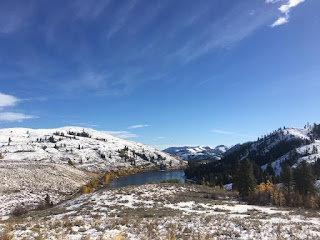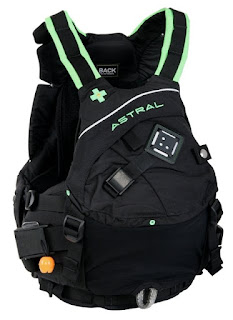How to Select a Kayak Outfitter
I am going to outline some basic steps to help find a kayak outfitter to take a kayak vacation. I will mainly use references to sea kayaking as that is what I am most knowledgeable about, but this advice could be applied to many kinds of outdoor adventure vacation activities. Through my years as guide and business manager, I have seen people put in unsafe situations and people spend money on vacation activities that was less than it could be - if not a bad experience. Therefore I thought I could provide some helpful tips to get the most out of your kayak vacation.
Many regions have a different sets of guidelines for choosing and outfitter and it is important to understand the environment in which you will be heading out in. Being the in Pacific Northwest where the water temps are pretty cold, winds can be strong, the currents can be extreme. It is important that you know a bit about the situation and that you choose to go with guides that are skilled and tall all the extra precautions to make you safe and comfortable. Some of my comments may not apply if you are looking to go with a company that offers sit-on-top tours in Florida, but even then, it is good to know what your getting into.
With all that said I hope this will help people find respectful and safe companies to go kayaking with.
Outfitter Websites: As with most things today the Internet is usually the place to start window shopping for your kayak outfitter. This is a good way to isolate outfitters in the region you plan to visit, but be careful when reading the content of the websites. Many companies will make amazing claims and show you images of great wonders with wildlife piled high in one image and kayaker in the middle. Here are a few things to think about.
- Images on the site: Do the images seem to be even possible. Believe me I have seen it all and Photoshop computer software can do a lot to images to make a fantasy out of bits of reality. Use good judgment and good common sense. If a company is willing to dupe potential customers with images on a website, then imagine what they will do once you arrive.
- Exclusive paddling areas: This statement I have seen more than once. There are times when this is true. But usually it means they are based in a resort and have an exclusive launch location, but the area can still be accessed by other companies leaving from a different location. But when you see these statements be careful. Usually this is marketing to get your business and when you arrive at the launch beach with every other company in the region, well you start to feel a bit taken. More often than not, outfitters paddle the same regions.
- Research or Non-Profit: I have seen this claim a few times. Yes, it can be true some of the time and yes, some organizations may even be registered as non-profits. Though this sounds philanthropic, it is in your interest to follow through and see what these organizations really do. I have found some really do research, but I have also found the opposite. Using the non-profit status and research tag is a great marketing tool that has been used more than once to attract clients. They use marketing tag lines such as, "Feel good knowing your money goes to save the wildlife". Such a statement should raise a red flag and behoove you to looking into such claims. Be sure to explore the company's website and explore their associated businesses and research institutions.
- Guide Training: You might be concerned about safety and if you aren't, you should be. Guides should all undergo training and their training should be on-going. Just because a guide is shown how to do something once, does not mean they have perfected the techniques needed to be proficient in rescues. Like everything else, kayaking takes practice, being a trip leader takes practice and being a rescuer takes practice. I have been a guide for many years and I am continually practicing my skills and taking courses to both refresh my techniques and learn new ones.
So, if you see claims like, "oldest company" or "I have been leading tours for the last 30 years", ask them if they continued their training or what level of training they have had, including first aid. In some areas, tandem kayaks are common for guest to paddle on tours. Be cautious of any company where the guide exclusively leads trips in a tandem kayak. Sometimes companies cannot help it, but they usually try to get the number of guest to be even to ensures the guide is in a single kayak which is easier to maneuver in a rescue. Single kayaks are more agile and creates a safer environment for the guest. Avoid at all cost, tours where odd number groups are required to run tours. This means the guide will must be in a tandem kayak, NOT GOOD. In addition, make sure the company provides all the guest with life vest (PFD's) and that the guides carry first aid kits, tow ropes, radios or other forms of communication if available, and extra warm gear in case of emergency. - Better Business Bureau: Check the company out with the Better Business Bureau and be sure to check all names a company may have. Sometimes a company will have more than one name associated with them. Check them all out as it is hard to say what complaints have been filed.
Check Travel Sites for Reviews: Though this is not a sure fire way to get information since companies that are issue prone will go to great lengths to leave an overly grand review for themselves. Sites such as YELP and Trip Advisor can provide information from past guest on tours.
Other Red Flags: Just wanted to bullet a few extra tips while looking over sites and chatting with kayak tour outfitters.
- Equipment: It is always best to figure out what you are paying for. Some tours market all inclusive but you end up providing half the gear yourself. Small details to think about. Will you be provided dry bags or foul weather gear for your day tour. If you are going on a camping tour will you be provided tent, sleeping pads, sleeping bags, dry bags, foul weather gear, forks, spoons, cups etc. You will find all "inclusive" means something different to everyone.
- Food: If you are going out for the day some outfitters will provide you lunch and some will as you to arrive with you own lunch. Make sure to ask what food will be served for lunch if it is provided. If you are going on a camping kayak tour see if all meals are provided. Some may not include lunch. Ask about snacks and other energy based foods that will be needed for the day while kayak touring.
- Payments: See if they accept credit cards and if they do be concerned if they want to add a percentage if you decided to pay by credit card. If they want cash payments only be concerned if you are dealing with a legitimate company. Requiring a person to pay large amounts of money in cash could mean to company is not on the up and up with the IRS or other tax collecting agencies. BIG RED FLAG!
- Outfitter Insurance: This is a very important issue. Some kayak tour operators may not carry liability insurance. A lot of the time these operators will avoid using areas for camping and launching kayaks that require permits, since most launch locations that require permits also require outfitters to have have proof on insurance. You do not want to go with an outfitter that does not carry liability insurance.
- Hints on Safety: You can get somewhat of an idea on safety by looking at the outfitters website. If you see images of guides or guest kayaking without proper safety equipment such as PFD's (life jackets). In any area I personally feel PFD's should be worn. But in areas where swift currents and cold water are common, PFD's are a must and should always be worn by guides and guests. Not wearing such safety equipment and posting images of such online is irresponsible of the outfitter. Use common sense and look for clues on unsafe behavior.
So what can you do to protect yourself from the above? It's simple.
- First go over the site with your common sense goggles on. Shopping for a grand adventure is fun, but do not let a websites content take advantage of you with unrealistic claims and images.
- Make a list of things that caught your attention, negative or positive.
- Call the company and discuss things that may concern you. You should always call before booking, even if you end up booking online. Collect as much information as you can about the company over the phone.
- Ask pointed questions. If they do research or make such claims, ask what it is they do. If they donate to research or conservation organization, ask for a history of who they donate to. See how recent the company's research is or donations have been.
- Check Travel Review Sites for further information.
- Feel good and comfortable with your decision. If for any reason you have hesitation, KEEP LOOKING FOR A OUTFITTER.
- Ask companies if they are members of local associations or business groups. Most lodging places receive commissions for send guest to certain outfitters so they are not always the best source of information. You should feel free to ask your lodging front desk when inquiring about an outfitter, if they pay commissions.
All in all I feel there are a lot of good outfitters out there working hard to do the right thing and provide a great adventure. But there are those that choose to take a different route to simply get as much business as possible.
I hope this small article has provided some good information for those looking to for kayak outfitters for their vacation. Shop smart and just use good judgment and all will be okay... and hopefully have fun!..



Comments